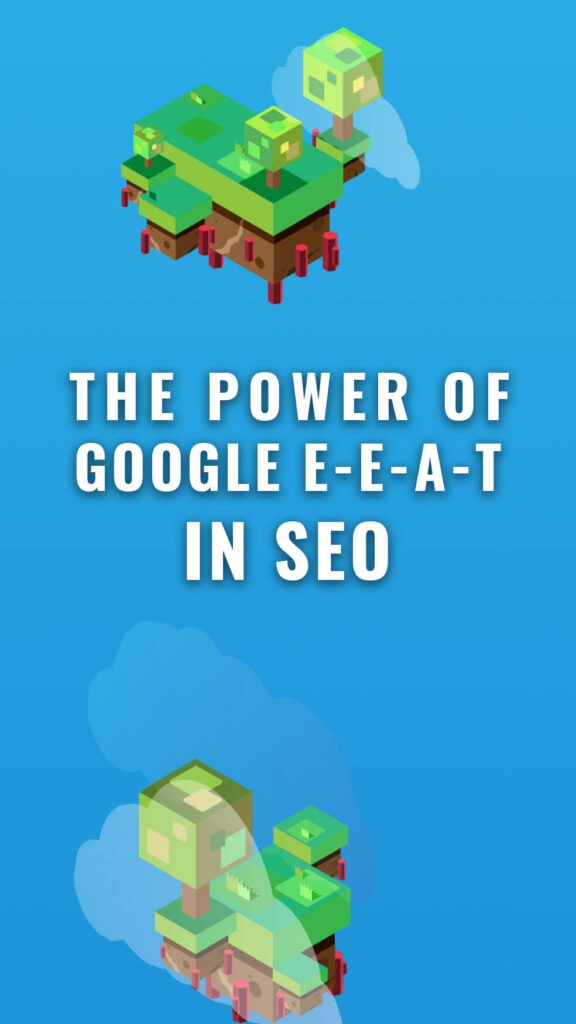Good SEO involves a large number of components, and one of the most important is an intangible concept known as E-E-A-T. This stands for Experience, Expertise, Authoritativeness, and Trustworthiness in SEO. We’ll examine how E-E-A-T plays an influential role in SEO and discuss how you can leverage it to improve you performance on search engine result pages.
Isn’t it E-A-T?
The E-A-T principle was first introduced in 2014 in the Google Search Quality Guidelines. It stood for Expertise, Authoritativeness, and Trustworthiness.
It gained significant importance in the SEO industry in recent years, as Google continued to place greater emphasis on the quality of content and user experience. Google has made it clear that it wants to provide an excellent user experience by showing its users the most relevant, accurate, and trustworthy content possible.
Then in 2022, Google added an extra E – so now it’s E-E-A-T (or “Double-E-A-T”), which has an added element of Experience. This change to E-A-T has been codified in the official search rater guidelines released by Google.
So Why Is E-E-A-T Important in SEO?
Google’s search algorithm relies heavily on trustworthiness when ranking webpages and websites; they want users to locate websites they can be confident are reliable sources of information. That’s why Google implemented its Quality Rater Guidelines which explicitly states that raters need assess content features like expertise, authoritativeness, trustworthiness (EEAT) when rating sites’ ability to satisfy user needs.
Thus E-E-A-T plays a considerable role in SERP rankings since it provides an assessment of quality beyond what is immediately visible through backlinks and measurable metrics like Domain Authority scores or Page Rank scores. Having good E-E-A-T scores makes your website more likely to rank higher than similar competitors who may have higher ranking numbers but lack the trust factors provided by a good rating from users.
So, let’s take a closer look at each element of E-E-A-T:
Experience
Experience refers to the level of expertise that a website has in a particular field. Websites that demonstrate experience will have a wealth of information, examples, and case studies that showcase their industry knowledge. The experience that a website displays should be relevant and up to date, and it should demonstrate that the website is an authority in its field.
To improve the experience of a website, it’s essential to focus on producing high-quality content that is useful and informative. This means avoiding content that is too shallow or general and instead focusing on producing content that is detailed, informative, and insightful. Additionally, producing new and relevant content on a regular basis can help to keep the website fresh and up to date, which can be a significant factor in Google’s ranking algorithm.
Expertise
Expertise is closely related to experience and refers to the level of knowledge that a website or author has in a specific subject matter. Websites that demonstrate expertise will have authors with relevant qualifications or certifications, and they should provide evidence of their credentials.
To showcase expertise, it’s crucial to ensure that the authors of the website have the necessary qualifications, certifications, or degrees. It’s also important to ensure that the content produced by the website is accurate, informative, and up to date. This means that website owners must invest time and effort into researching their content and ensuring that it’s factually accurate.
Authoritativeness
Authoritativeness refers to the level of trust that a website has earned within its industry or community. Websites that demonstrate authoritativeness will have a strong reputation and a history of producing high-quality content.
To improve authoritativeness, it’s essential to focus on building a strong brand reputation by producing high-quality content consistently. This means producing content that is useful, informative, and insightful, and that resonates with your target audience. Additionally, building backlinks from other authoritative websites can also help to improve the authority of a website.
Trustworthiness
Trustworthiness refers to the level of trust that a website has earned from its users. Websites that demonstrate trustworthiness will have a strong reputation for producing accurate and reliable content, and they should demonstrate transparency in their operations.
To improve trustworthiness, it’s essential to focus on building a strong brand reputation by producing content that is accurate, factual, and reliable. Additionally, ensuring that the website is secure, easy to navigate, and has clear contact information can help to improve trustworthiness.
In conclusion, the E-A-T principle is an essential part of SEO, and it’s crucial to ensure that your website meets these criteria if you want to rank higher on SERPs. By focusing on improving the experience, expertise, authoritativeness, and

